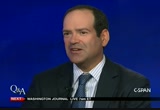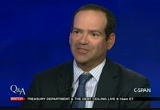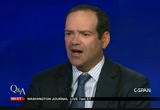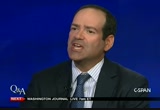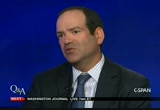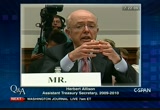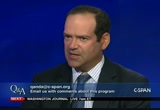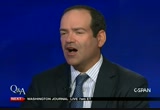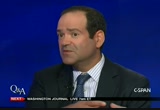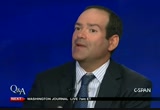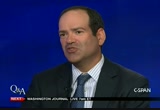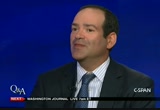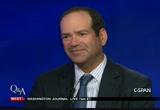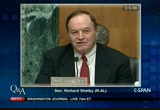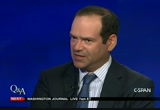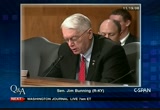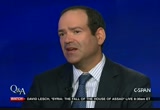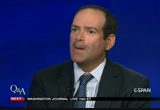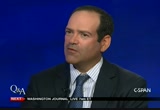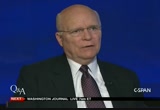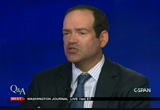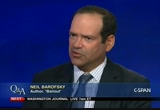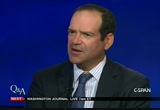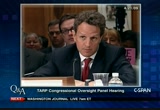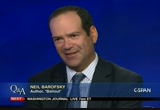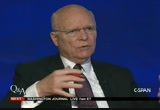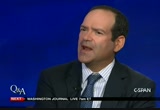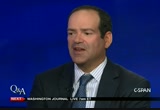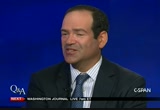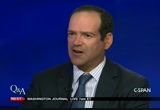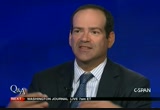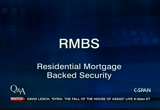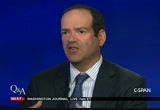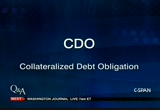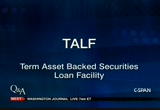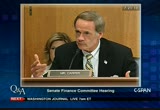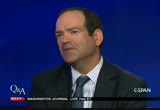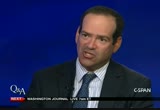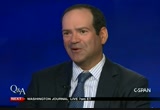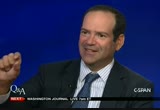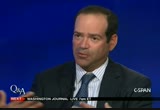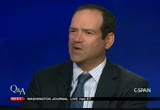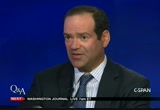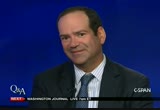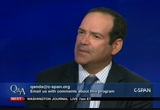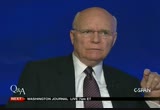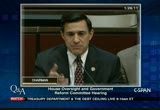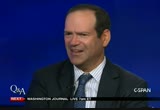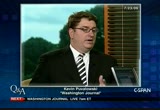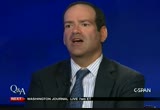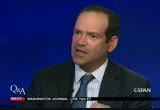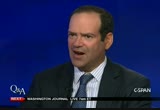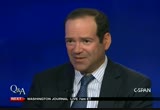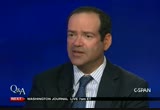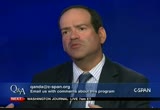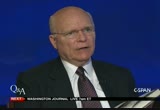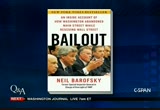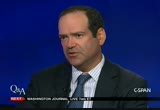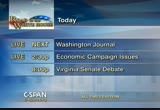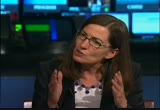tv Q A CSPAN September 24, 2012 6:00am-7:00am EDT
6:00 am
went on to become an obama nominee for the southern district of new york. although our discussions were very political, it is not about partisan politics. it was really never an issue. you lead off this story with a man named herbert allison. who is the and what role does he play? >> he was the assistant secretary of financial stability commodes -- financial stability, prior to that, he had a storied career on wall street. he had just about every major job he could think of that merrill lynch. he went on to become the ceo of tia craft and retired in 2008 when paulson called him as the financial crisis was starting to take off to come to washington
6:01 am
6:02 am
it was my job was to criticize him and make recommendations where i thought he and the program gone off the rail. which by 2010 was pretty often. we sat and had a meeting offline to clear the air and can have a couple drinks and diffuse what was a building tension between us. our weekly meetings diinvolve into shouting match. after the meeting, i got a real taste how washington works. we had a chitchat and small talk about our families. i told him my first daughter was about to be born. he talked to me about his commute to washington and back and forth to connecticut where he lived. he eventually turned the
6:03 am
conversation and pointed out i was young, my job is special inspector general. sort of asked me what my plans were and what i wanted to do next. as we started discussing t we gave me a warning. he was i was doing myself real harm for my future prospects in his words. by that, he explained had had a harsh tone. i was critical of wall street and very critical of the obama administration as i was carrying out my job. we warned me if i didn't change my tone, it was going to hurt my ability to get a job after sigtarp. when i left the government to get a job on wall street, i was doing myself real harm. when i, plained i wasn't interested in that, he said even within the administration. i changed my tone and good things would happen to me. he mentioned a obama appointment as a federal judge. at the time, when i heard that conversation, i thought i was being threatened or bribed. i thought i was hearing, basically you don't shape up mister, you will ruin your entire career. if you change your tune, good thing can happen to you. later i realized he explained to how washington works and what it means to be a regulator in
6:04 am
washington. that means pull your punches, go with the flow and roll and great things can happen to you including a rich career on wall street. but speak your mind and be effective. >> herb allison came from merrill lynch. also rain the john mccain operation. here is are some video i want you to see and fill in on this. [video clip] the sigtarp had suggested dozens of ideas to us and we look back and we've accepted in a way very similar accepted the sigtarp's recommendations about three fourths of the time. there are some cases we have determined that in the interest of financial stability and because we can find other ways to protecting the taxpayer, that we decline to implement. one of these cases has been the creation of a wall. in many cases, here i draw upon 35 years of experience in the financial services industry, in many cases, it makes great sense to
6:05 am
have a wall to separate asset managers in area from asset managers in another. in the case of asset managers we're hiring on behalf the taxpayer. we want to have their best talents working for the american taxpayer. >> one language i want to ask but later, what was your feeling? beenis a man who's enormously financial successful, he's in the treasury department and you're there. how can you have any power over him and in the job you've having? >> all i really had, we had power of logical argument. what i learned over time from advice from others as well as just sort of figuring out, i wasn't really going to be able to directly influence treasury officials. i can do my recommendation. if they will be easy to implement, they would
6:06 am
probably take them. herb mentioned that they did adopt a number of them. for the big issues, they intended to at least initially ignore us entirely. what i learned was, i had to use the press and what i learned was i had it -- to use the press and congress to get external pressure on treasury to see what was doing. that was a great example. one of the tarp programs we identified significant problems. through our reports -- we would file quarterly reports to congress through interacting the press to make sure they understood what the issues were and try to explain it to them that were easy to understand and adjustable and accurate and we were able to get congress engaged. being in constant telephone and going up and down to know as much as i can to explain our view, we were able to get
6:07 am
external pressure like we saw during this hearing where members of congress would put pressure on treasury to better protect the taxpayer and some of the programs. >> what was your title? >> special inspector general for the troubled assets relief program. it gave treasury the ability to be allowed the banks. they also created this brand-new entity called sitarp. our role was to provide oversight, a brand new agency. we were that the fbi. the second part was this oversight mechanism where we would do these reports to congress every quarter and special reports and special audits we would do of specific programs. >> where did you get your authority? >> from congress, this legislation. it provided that we had all the authority of any inspector general which are these similar
6:08 am
type of oversight agencies that are attached to each department and many agencies within the federal government. >> you say in your book, you were not terribly impressed by the number of inspectors general of around town. how many are they? >> i think there are 64 or 65 different ones. one of the things -- when i first came to washington, i did not know what -- know what and i g did. my experience as prosecutor, we would occasionally run into other law enforcement arms. for while i was doing mortgage fraud cases, i started up a mortgage fraud unit and i was dealing with the inspector general from hud, very good law enforcement agents. but i did not know the big picture of what's an ig was doing -- when i got the job one of the first thing that did it was meet the different ig's. over the next couple of years i found that the inspector general's ig -- unfortunately although they are supposed to be
6:09 am
fierce watchdog's looking into waste, fraud, and abuse -- what is written in the statute -- to they were often just like any other governmental the agency. the number one concern seemed to be things about to budget -- their budget, how to preserve their budget. there were very worried about clashing with management and too much interactions with congress. and it was really a goal long, get along attitude. what i kept hearing is there were three different types. lapdog who presumably would curl up in the lack of management, a watchdog, which was sort of in between -- in between, and the junkyard dog. i think ultimately one a was going through the confirmation i was told by senator baucus, the head of the finance committee which overside one of my confirmation hearings, that i needed to be like a junkyard dog. but the ig's was saying i should not be too aggressive and be more like a watchdog. unfortunately it in practice it
6:10 am
seemed there were more concerned with keeping their job and a big offensive than being a strong advocate for the taxpayer. >> 64 inspectors general -- does the public get its money's worth? >> sometimes. i think there are some who do their job well. there are some -- i did -- those are the ones you hear about. when -- he really led the investigation into the politically motivated firings of u.s. attorneys. that is an example of extremely aggressive, effective ig. i was once asked a question why a particular agency did not have an ig will we were doing it and it turned out they did. you just did not hear about them because they are so not out there and aggressive. i was told by one point blank that he wished he could do what
6:11 am
i was doing what he was afraid for his job. he had a kid in college and could not afford to lose his job. they live in fear of being fired if they are too aggressive and caring of the duties. >> quick black -- background. under graduate school? the university of pennsylvania. >> studied what? >> a degree in international relations and economics. >> what year? >> 1992. >> law degree from what school? >> university -- new york university. >> you were born where? >> abingdon, pennsylvania. >> grew up where? >> lived in that area, new york, and minnesota. >> what the mom and dad do? >> they had a small travel agency. >> married? when did you get married and how many children? >> married august 8, 2008 -- specifically so i would never forget it, and i have two kids. one is about two years and four months and about four months.
6:12 am
>> hall law were the prosecutor in the seventh district of new york? been eight years. >> what did you visit the prosecute? >> narcotics and international narcotics for a number of years and then securities fraud and then when i was fired i recently started up a mortgage fraud group. >> how long the government and treasury department? >> 27 months. >> starting what date? >> december 15, to about the night in stepped down march 30, 2011. >> here is senator richard shelby talking to you about what you should be doing in your job. >> this is a very important job you occupy -- special inspector general of this tarp program. a lifetime of opportunity of public service does very few people have the chance to do right. you might be unavoidable after you do this -- unemployable you do this. but people have to fear you in
6:13 am
your office. if they don't hear you, they will play you. they will deny you this. senator dodd wants you to tell this committee what you need at all times. if somebody is stifling you, we want to know. >> what kind of money that congress give you to spend in your job? >> the original outlay was $50 million. >> for how long? >> basically until we ran out. and then we went back, then we would have to go through the normal budgetary process through treasury and why house to get additional funds. but i would say in this age of a lot of agencies getting to not funding -- whenever had a problem. we were always more than adequately funded and senator shelby kept good on his promise at this -- as it converts to make sure not only did we have adequate resources to do the job of that type of support and backing, which was absolutely instrumental, especially from
6:14 am
both parties. the republicans, as you can see from senator shelby but also from the democrats. probably even more importantly from the democrats once the obama administration took over that they also strongly support of what we were doing and helped keep the pressure on treasury. >> senator jim bunning -- former senator of kentucky had this to say to you during the confirmation process. guest: >> the bailout law allows $50 million for your office. so, you will have a very ample amount of resources. but i have serious concerns with your nomination. the nominee may be a dedicated public servants, he appears to be a skilled prosecutor and a man of integrity. but i wonder why taxpayers should have to pay $50 million to a watchdog will have nothing to watch. ultimately, i believe mr.
6:15 am
barofsky, which is impressive legal skills can serve the public are better in the southern district of new york where he can continue to prosecute mortgage fraud. >> where it was senator bunning coming from? >> i think he was very much a prose -- opposed to tarp of the first place, the whole legislation. i think he was uncomfortable with creating yet another new federal agency which a $50 million budget. look, that is an understandable conflict. there are a lot of people out there who feel more government agencies is not the solution. i will say, though, essentially i brought senator bunning over to our side. he eventually co-sponsored a bill that expanded our power and jurisdiction. one of the most remarkable things, any hearing right before he sat down, he said i did a pretty good job. which, for senator bunning, but i understand, a remarkable compliment. i think he was coming from an understandable place given week have seen in government. on the other hand, as an agency,
6:16 am
we more than pay for ourselves many times over. just in one case we kept more than half a billion dollars from going out into an ongoing fraud because of our investigative function. >> what does it say to the american people that we need 64 inspector general and we have to have $50 million expense to keep people honest inside the government that we elect? >> i would say with respect to this program, it was extremely necessary. the reason why it, is when you have a program like this, which is designed at the outset to bailout of banks and help wall street institutions, the people running that program within treasury all came from the same mindset. this was a the same when it was hank paulson's treasury department under president bush and it continued under president obama with treasury secretary to invite. the all came to the problems with a wall street perspective. their biggest concern over and over was protecting the banks, protecting financial system.
6:17 am
but they did have people who were sensitive to the issues -- the fact if you are shoveling hundreds of billions of dollars out, you have real vulnerabilities to fraud. there are going to be those who are going to try to still that money. they are not as attuned to conflicts of interest. the run ever cognizant of the factors he needed a degree of skepticism with the people and institutions that they were interacting. so, our role, and i think the roll call i.g.'s should be is to be the voice of the taxpayer, the institutional concept of pushing back when money is being pushed out with not enough strings attached. when there are potential vulnerabilities to fraud. frankly, if you have a career of goldman sachs you're not really going to be sensitive when you are pushing the money out. one of the things i saw all over again with this presumption of goodness, that these banks and executives would never, ever take advantage of the taxpayer by putting a prop in just over that of the public interest.
6:18 am
and i think our voice was one of skepticism to help try to rein that back in. >> you prosecute somebody but the name of antonucci? who was seen what happened? >> you was essentially the ceo of a smallish bank in new york to try to get tarp money by cooking its books. committing a type of accounting for about essentially make not look like they had more bank capital, which is basically a cushion has against losses. it is what stands between a bank failing -- if it has a certain number of losses -- or being able to withstand the impact through their own shareholders. he had engaged in some trickery to make it look like the bank was more healthy than it was. i don't remember the exact amount. $11 million of taxpayer funds. we worked with the u.s. attorney's office and the southern district of new york to try to investigate him, prosecute him, and ultimately pleaded guilty to the charges. >> here is a list of of acronyms
6:19 am
that you use in your book. i listened to your book in the car while traveling, and you got used to hearing tarp, sigtarp, hamp -- how does the average person understand all of those mean? >> in a hard copy, we have a handy glossary which helps explain these different terms. look, it's government, and there is an alphabet soup in government. i really tried in the book to make it as understandable, but unfortunately sometimes just conversationally trying -- especially trying to recount the conversations that we had, we would not refer to the home modification program is that, but referred to as hamp? >> what is hamp? >> it was the program that the obama administration launched to
6:20 am
try to meet the original requirement covers put forward, not just to help the banks by bailing them out but also do something the foreclosure crisis that was raging in 2008. and congress insisted on the give treasury authority to go bailout of banks, also do something for homeowners. that program was launched. now the intention is to help over 4 million people stay in their homes. unfortunately it has fallen far short. >> how many has it helped? >> about 800,000, 20% of the gold. in the book would talk about the program design flaws and also the intentions. recounts conversations i had with secretary geithner and others that the program was really more about helping the banks survive the crisis than necessarily try to get 4 million people to stay in homes. >> how much politics was played? >> a tremendous amount of politics. in the way they fought back against some of the recommendations we had made to try to deal with the foreclosure
6:21 am
crisis had on, later to have a defined success under the program. a very quick example -- they originally said 4 million people would get helped by the program. when it became pretty obvious that would not come near, they said, no no, that was not our intent, just to make 4 million offers. whether people accepted the offers and what of the modifications -- that people stay in the homes, that was not part of what we were trying to do. >> as a democrat of your life and sitting in this job first and the george bush administration. what was the feeling you had with hank poulson and the feeling you had with timothy geithner when president obamacare 1? >> i think i anticipated a major change because of the political differences but substantively there was almost no difference. that level of deference to the banks and putting the bank's first was really the same under
6:22 am
the poulson administration as it was under the geithner administration. in a personal level the two are very different. poulson was very welcoming. he swore me and my first day. he had sent a message out to the treasury department that he wanted to make it work with sigtarp. my first day they were just about to put the money in the auto industry and the and greed -- agreed in concept to protect taxpayer money. timothy geithner was much more dismissive. i did not really meet with him all that often. maybe a couple of meetings. at times, he was very combative, at time aggressive, at times, profane. i think stylistically there was a difference. but substantively unfortunately we really saw much of the same, which was pushing back on what we thought were pretty common sense approaches to protect the tax plan. >> put this into the equation? this is elizabeth warren at a hearing questioning 10 geithner. [video clip]
6:23 am
>> the government had to act early and with substantial force. in the largest and weakest part of the system. in the context of fannie and freddie and aig, it was clear that the conditions came with changes and board and management for exactly the reasons he said. >> i am sorry, just want to mature i am following you. your sitting there have been changes in management, financial institutions buss received tarp funds? >> in the context of the interventions taken and fannie and freddie -- >> ask about the financial institutions. among those are -- >> asking about the banks. >> going forward, where institutions need exceptional levels of assistance we will make sure that assistance comes with conditions that comes with the necessary agree -- degree of accountability so the firms are stronger and weaker. >> what did you see? >> i saw a classic refusal to answer a question.
6:24 am
we saw this over and over again. what elizabeth warren was asking was -- when you rescued the banks was that any change in management? >> geithner's response was a year at aig and fannie and freddie, and she came back a couple of times as she would do, but he did not answer the question. because the answer was, obviously, no, they did not compel a change of leadership of the big banks. they kept their jobs, but kept their bonuses. you kept rich compensation. the bonuses were soon restored for the executives. and rather than answering the question you did the classic washington bach and we've, which is a practiced art in this town of not directly answering the question. >> to the average person watching the the there had must be spinning. we live here and it is bidding. you got elizabeth warren sitting in a senate hearing room -- she is not a senator -- questioning the secretary of the treasury.
6:25 am
and you all are really all democrats all part from an administration of sorts. what role did she play? you had a lot of plunges occurred during wartime when you were the sigtarp. >> she was the head of another oversight entity that was created in that same top legislation called the congressional oversight panel. so, congress wanted to have its own eyes and ears and created the special entity to provide another level of oversight. this is a body of five panelists -- three democrats, to republicans. and elizabeth was named its chair. so, we had different roles and providing oversight. we were on the one hand inside the treasury department, we were part of the executive branch. a lot of our job was open with program formation as well as our law enforcement will. they had more of a congressional type of role, which is why they have the ability to call hearings and take testimony and try to bring transparency in that way. i think they tried more of an
6:26 am
academic approach to analyzing the programs more from after the fact. >> the public says -- we got united states senators, why can't they oversee this? why do you need to bring another entity in? >> i think they brought a very specialized skill. on the panel you had some members of congress initially but you also had professors like elizabeth warren. they were able to comb through their own budget, bringing a pretty impressive array of experts towards different issues. could congress have done it? probably. but i think this level of specificity and depth, which they did in their report, i don't the you would normally see that from a congressional. but what does it mean that hank paulson, secretary of treasury, had been a head of goldman sachs? and boston geithner, secretary- treasurer, had been head of the new york that? what does all of the mean -- and if you are outside looking in, is a good for us or bad for the public? >> i think there's good things and there are bad things about it. the good thing is when you are
6:27 am
in the midst of a financial crisis, there is some benefit to having folks who come from these will street institutions. obviously, goldman sachs is a wall street institutions. the very definition of one. the new york fed as a regulator that fits in new york city, deals on a daily basis with their large commercial banks. commercial banks said on to invite the's board -- jamie diamond from j.p. morgan chase. >> if i worked at the new york fed but i get a -- do i get a check from the federal government? >> an interesting question that even the fed is not clear about. the federal reserve is very much part of the pro-government. the new york fed is this public- private institution -- indication when they are trying to beat back disclosure under the freedom of information act. they would say they are a private corporation. but obviously the very much involved in carrying out public policy. so, i think the check probably says new york fed. they are funded by dues that they collect from the bank with
6:28 am
in their district as well as money earned from carrying out very much government functions. it is sort of an interesting problem i think what the system is that it is not entirely clear, but mostly they serve primarily a government function. >> you are going to serve the same role that bill burke bid for you, with somebody, to now and saying i've just been asked to go into pick your future crisis, to be an inspector general. what a piece would be given? what would you want about? >> stay home. [laughter] that would be my first one. but if you do go win, understand that you are going -- something i did not appreciate. a political minefield that you really can't imagines. bailouts were very politicized of course going in. and it only became more so. and every aspect of a crisis, any type of crisis -- there is
6:29 am
going to be tremendous political pressure on you from all sides to shape your job of the shape your reports, how you approach would you do. i was constantly told about things i should not be doing that were outside of my role. i was not supposed to get involved with policy decisions. i was not supposed to get involved in program formation. i was not supposed to talk to the media. all of these things -- are going to hear all of this advice, but ultimately go back to your statute and see what created you and what your job is at stake to what you are supposed to do. ignore all the political noise and do the job that -- if you are presidentially appointed, what the president appointed you to do, which was to ferret out waste, fraud, and abuse and represent taxpayers best weekend. >> in 2008, you report for duty. first of all, what is tarp? >> tarp stands for the troubled as a relief program. the original idea behind tarp,
6:30 am
we were in 2008 and the banks were just hemorrhaging losses. huge amounts of losses mostly coming from that on real-estate. we had a huge bubble to in this country and housing finance and a lot of banks had a lot of exposure if the complex financial lunch demint. but a simple way of looking at it was housing went down and it took a lot of the banks who had exposure -- investments in housing down with them. thus created all sorts of runs on the banks. the original idea of tarp web and was going to buy these assets, these real-estate related assets, these bonds made up of bunches of mortgages and other bonds made up of a bunch of other bonds. it gets to build a complicated. the government was going to buy them from banks to try to stop the bleeding and bring back a degree of financial stability. that is what a lot of members of congress thought they were voting for when they voted for type -- tarp. >> what is a rmbs?
6:31 am
>> it is called a residential mortgage-backed security. in the simplest terms the way to think about it is in the run-up to the crisis and even before that, financial institutions would take a whole bunch of mortgages and put them together into a box. people would buy different parts of the bond. and when people would invest in the bond, they would be getting a claim to each of the monthly payments that everyone who has a mortgage behind that bond would make. thousands and thousands of mortgages get put into one bonded people invest and that by buying these bonds which give them a right to those incomes. those are called mortgage-backed securities because it is the mortgage that backs the bond and the -- and they are home mortgages as opposed to others. >> do you still have them? >> we still have them. they are still there. but really the private market for them, where wall street was putting it together, has almost disappeared.
6:32 am
right now it is almost all government funded. >> what isp-pip. >> it is the public private investment program. it was originally envisioned to be a trillion dollar program that was going to help all to levi those same toxic assets. after tarp was passed, the money wasn't used to buy the bonds, it was used to plug the holes in the banks' direct about buying shares in their stocks, increasing their capital, ability to withstand future losses. ppip was to marry treasury money as well to private money as well as a reserve money to try to recreate that idea of buying these rmbs, mortgage bonds, and other things created from them. ultimately the program was a failure and the thing may be $20 billion to $30 billion that spent. >> what is a cdo?
6:33 am
>> the bond of bonds, if you will. collateralized debt obligations. these were really some of the toxic -- when people talk about troubled and toxic acids, this is what they were talking about. they would take a whole bunch of mortgage bonds and package them together and sell a right to buy pieces of that bond. if it sounds hopelessly complex, it is. >> talking about the different levels of tranches? >> yes. >> is it a bad deal if you are outside looking in as a citizen? >> ultimately because the way they were created, that were created with some of the most poorly performing mortgages, some of the riskiest mortgages, mortgages that were riddled with fraud because the banks were putting it -- who were putting them together did not care what the performance was because there were just selling them off to investors. these all got concentrated in these cdo's and when they blew up they took the and it's a system down. >> one more, talf.
6:34 am
>> another government program, also part of tarp and part of the federal reserve program. term asset backed securities lending facility. what it tried to do, again, with moderate success, was to try to bring back a whole other way that a lot of consumer loans in this country get funded. things like although loans and student loans, different other types of loans that would be bundled up in other types of securities, other types of bonds, and that program came on. >> here is senator tom carper from a hearing talking about the gm bailout. [video clip] >> with respect to the auto -- gm and chrysler, my recollection is that gm made some repayments, of what to say 6 million or $7 billion -- like taking money out of one pocket and paying peter
6:35 am
with's money. could you refresh my memory? >> all to live -- part of the $49.5 billion we received equity in return. part of it was preferred shares and approximately $7 billion loan. that loan was repaid the money that came out of that park escrow account. so, the money had gone over to gm, so it goes in the possession as part of the bailout, but a segregated account of tarp funds. >> taking a deep breath as a layman, how are we supposed to understand this. in the and, what is the bill on gm? was the bailout the right thing to do? did they pay their loans? >> this is sort of an example, i think, of the government and the charge of a department taking a perfectly good story and then trying to make it look a lot better than it was for pr purposes, for political purposes. and as a result, you end up with is confused mess that ultimately seems a little
6:36 am
misleading. what happens here is that gm had paid back part of its loan. we are still on the hook for tens of billions of dollars for general motors. we'll shares of their stock. but another part in was through her alone. ultimately but they repay that loan, which was made with big announcements on the why house and the treasury department, they used other top money that they had received as part of the bailout from some of that stock that we have and use it to pay off the loan. it was good news that the payback the loan. it was a lot of tarp money sitting around that they did not need in order to get the money afloat, and they used to pay back the loan. that was a good thing. but they did not disclose where the money came from and then made a sound like it came from just selling a bunch of cars, they all this cash. but my job was to rein on the parade the little bit and clarify where this money was coming from -- rain on the parade.
6:37 am
we see a lot and tarp -- like all on government -- taking good news and trying to turn it into something else. as with the bigger question, it's very hard to say what would have happened had we not be about gm and chrysler. the estimates of the job losses are all over the map. all know is from, being in hank paulson's off as my first day into thousand eight and him telling me they did not use tarp funds the bailout -- -- gm and chrysler, those of the commission would go bankrupt and disappear. the impact on our economy at that time i think was too frightening to contemplate. i think it was probably the right call. >> you talk about the first couple of days and paint that picture if you would, again, of where your office was located, what it looked like and what you found when he got there and the secretary of treasury and mr. allison's office and the inspector general of the treasury department. what was the different?
6:38 am
>> it was a comical. i went through my interview process. i went to different offices around the treasury department. i saw the i.g. a treasury who had this remarkable four offices combined to one with the sweeping view of the why house. the treasury officials -- one was actually -- a rope off part of the tort and after the meeting i that sworn in by server 3 poulson and had this remarkable meeting. we will take it to your office. we kept walking down the stairs and down the stairs and down the stairs. the venture was hit by the smell of bacon and egg because we were right next to the treasury cafeteria. we walk into this very dismal grungy basement office where we had this smell, i'll never forget. it's sort of hit us as we opened the door. it was there for months. we letter found out it was an open switch pipe right underneath of the office. instead of these palatial views of the why house, all we had
6:39 am
were these david lebron and shirley type windows where you -- windows were you did jesse the ankles of people walking by. i come from pretty 70 style building from and had one at the u.s. attorney's office. it was quite a contrasting what the police offices which was senate confirmed official and seeing where ty dumped us. and, in your office and you tried to get a meeting with timothy geithner. you go from your office to a nice office and the man who is secretary of treasury -- ditties have any say of your life when you're in that was a big point of contention. the way we viewed the statute and the way, as though the bill made it very clear in our view we were an independent agency within the treasury department,
6:40 am
which meant that the president of the ninth states could fire me at will -- basically a stroke of his pen. but basically we operated independent. they went to the department of justice and actually saw to give a ruling that i was under his supervision which would have given the secretary potentially the ability and authority to shut down all that he did not like, set down investigations he did not like, keep me from releasing some reports. we ended up fighting tooth and nail using some of our friends in congress to help push back on that and ultimately they walked away from the fight. but ultimately, no -- after the review that request. >> your most contentious moment with the 10 geithner? >> we had a meeting i had asked for, essentially at the treasury had refused almost for a full year to require tarp next to report on how they were using the funds. we thought that was a real
6:41 am
failure in transparency and there had been other transparency failures that followed. i wanted this meeting to try to personally impressed upon them, because i had been saying to her allison and his predecessor but have not had a chance to voice it to a secretary that they were really doing themselves harm, the country, and themselves harm because there was a perception -- perception out there that all bailouts were just a giant transfer of wealth from the taxpayers to a handful of executives and the secrecy might not be -- it was viewed with a degree of cynicism that could have a lasting impact on our ability of the country to govern itself. i wanted to make an impassioned plea he needed to reverse these policies and be more transparent. as i related that case out to him and explain to him that he was not being sufficiently transparent, the meeting got really contentious. to put it mildly, he disagreed with my contentions. he used a lot of obscenities in expressing his view that he had
6:42 am
been one of the most transparent secretary of treasury in the history of the country, that he forced the banks to disclose things no one else would. he sort of follow the pattern for about 40 minutes of really explosive obscenity-related tirades against need. let me be clear -- i am not complaining about that. it is sort of the nature of a very contentious meeting. but still inside, i am still just a prosecutor from manhattan's and also i got one of the most powerful officials in the world dropping f-bombs on me. it was a remarkable moment and my deputies who had come with me from the year, we look at each other and it was this remarkable thing. here we are trying to advocate for what we think we're pretty common-sense changes at and this deep level of animosity and condescension was somewhat remarkable. >> you were 39 when you took the job. >> 38. >> are you 41? >> 42.
6:43 am
how old was 10 geithner? >> i am not sure. i think he had just turned 50. >> is he a lawyer? >> no. >> if i were in my office, i would say i am the secretary treachery. this guy is just a former prosecutor. i and the cabinet. he is just a guy near the kitchen downstairs smelling the pipes underneath, why should i put up with his nonsense? >> that is clearly what he thought. but i just go back to house rick perry poulson approached the job, who understood as a prosecutor and someone knocked -- who was outside of the wall street bubble. poulson and linda geithner completely surrounded himself from people on -- with people on goldman sachs, bear stearns, merrill lynch. from an outside perspective, especially one sensitive to the issues of fraud and abuse, that that is a valid voice to hear. even if you disagree with that voice, even if you think that voice is wrong, it is still valid to get that input so you
6:44 am
get something to pierce the echo chambers of these pro-wall street voices. >> what was tim geithner's motive? he is not going to continue as secretary of treasury, the matter what, i guess. >> i don't want to speculate on his motives. i can comment on ideology -- and it really reflects the wall street ideology, the sense that what is best for the banks is best for the country. these top banks. when the banks were telling him that more transparency would be dangerous -- the things i heard more transparency, things like having to account for how the spent the money could be easy -- it could be dangerous, it could take down tarp, the banking system. i think he accepted those voices on wall street without questioning that. i was trying to give him counter argument and give examples of how these things could be done. it was completely invalid. i think that is a real sense, the regulators and treasury, if you are not among those bankers you really have no business having an opinion.
6:45 am
>> who is 10 assas. >> herb allison's successor. he worked with heard as the chief counsel for tarp and then when herb allison stepped down in early october 2010, he took over. >> here is a protocol issue that you write about in your book between tin and yourself at a hearing. let's watch. [video clip] >> as is the custom of this committee we would ask your for itain statements be placed in the record and you limit your opening statement as close to possible to 5 minutes. as with the custom of my predecessor, you will see three nights. green means to go, yellow is the warning that he should not run through our intersection and red and all 50 states, means stop. thank you, mr. chairman. the normal rule of committee is that we go in order of rank.
6:46 am
mr. massas, i believe ubique call -- but protocol will be first. >> thank you, mr. chairman. >> we don't go on with the testimony. what rankles you about that moment? >> when i came to washington i didn't give a fig leaf aut protocol. did not really understand it. usually violated it. under protocol, i was a presidentially appointed senate confirmed official. at the time, mr. massad, was acting, who was not confirmed ship -- so by protocol i should have on first. the funny thing now, i saw red. and i was so upset at this light that i had imagined, that afterward i went to buy legislative director and said you need to tell -- i use my own salty language -- you need to tell the staffer that there are 100 senators's right out right him, and this is is first.
6:47 am
and he's got to understand the basic rules of protocol. i got home and told my wife about it and she just burst out laughing. she is basically like, what's wrong with you? what happened to you? i look at it and i started realizing, she was right. literally that night i start working my letter of resignation. because this is part of the influence of washington and of power. i had so much become part of this system, that -- the system that i airport when it came there that i was not getting upset about something as trivial and stupid about the testified first. at that point, i was thinking about stepping down. i think it was in january of 2011. and that's really solidified it for me, that i was becoming part of the very mechanisms of power that i so detested when i first got there. >> he said a lot of good things about it a pity. he appeared in a lot of our call-in shows. [video clip] >> if you add all the programs up and assume that every program was fully subscribed at the same
6:48 am
time, you get a total amount of support from the government of $23.70 trillion. we've made it clear in the report that were not suggesting that is $23.70 trillion or the potential loss of these programs. they involve a significant amount of collateral. some of the programs have been discounted -- discontinued course of the money have been repaid. but if you look of the programs of what the government has said is the total amount of support available under these programs, it added up, $23.70 trillion. >> is there any way to make this simple to understand? $23.70 trillion, who could understand that? >> the number is so big it almost defies understanding. the way to understand, when we had a financial crisis, the government was in a full-blown panic. there was really no other way to explain it. they were worried about the next great depression and they through the kitchen sink at the financial system.
6:49 am
they made promises and guarantees across the board. almost anything you could imagine to help support the largest financial institutions, to keep them from failing. that included the $700 billion which is the .7 and the number. but also a wide array of guarantees. if you add them all up, the number comes out to $23.70 trillion. it includes more than $3 trillion to guarantee all the money market funds. all the money market funds were not all going to fail at once. but the significance is the government said, even if they did, we put up three. something trillion dollars and you get a sense of the total number -- level of commitment. this was at the very beginning of the regulatory reform debate and we thought it was very important for congress to know, the american people to know and frankly, i wanted to know. i did not know what the total number was and no government agency had done some. so they can understand just how
6:50 am
broken our financial system was and how extraordinary the government responds had to be. but actually kevin was given that response -- treated this huge controversy, the numbers that took that out of context, than we would lose 23 with $7 trillion which she never said. i think what was most uprising was the attack that we got from the why house and the treasury department, who we naively thought would be really supportive of the idea of painting a picture of how extraordinary bailouts were. it was definitely not the case. >> you hired a chris from -- sigr, one of the acronyms, but general -- gentleman who ran the inspector general from iraq -- why did you hire her question of what was the reason? >> she came in -- what started off it was just two people and i realize we need a depressed person. i had already realized i had no idea how to deal with the media
6:51 am
and had gotten good advice that i should hire a press person. when chris came in to interview, it was like she was explaining a whole other world as i had no idea existed, which was the world of press in washington. the first thing she should to -- she said to me was, i will not lie for you. i never asked you to live for bid. i asked what she was talking about and she explained how the press works and how she believed it was very important for this agency, a new agency, to completely up front with the media. to never spin and never do a lot of its -- the tactics that a lot of agencies do, which is off the record or on background, which means telling the press something and not putting your name behind it. which is one of the great tactic in this town, people say -- you could say anything when your name is not attached to it. you can lie, make things up, exactly. he was basically saying we are not going to play -- if i were to hire her, we will not play any of those games. we were going to be straightforward, tell the truth, and expose when we make mistakes
6:52 am
-- and we did make mistakes, and we will admit them. and her strategy -- and it was a strategy, not just being kind hearted, is we would build up so much credibility but the media and congress that when we are under attack -- and she saw we would eventually be attacked -- did not really think of the back in december of 2008 -- that we would have this level of credibility that we could use to fight back. i was ready to hire on the spot. i never met anyone like her. i never heard -- but all of it may perk cents per dam it in the end, how many people work for you? >> i think one step down, room 120 or 130. >> is there still a sigtarp? >> there is. it will continue as long as treasury has outstanding assets. >> we were given the impression that the top of money was paid back. >> a lot of the top money has not been paid back. we still have exploited to aig, to general motors. i think there are still hundreds
6:53 am
of banks that have not repaid their t r -- tarp funds. the hamp program is limping along, not at a glacial pace. 8000 are 12,000 month. it is still an active program. >> have the big banks pay their money back? >> the large banks have mostly payback. allied financial is a big bank that still owes us -- >> that is the old gmac. >> this book, "bailout," hubie want to read this and who will give you the most satisfaction, what kind of person? >> i want everyone who will to read this book. i want people understand and care about the financial system and what has happened to our government, i want them to read this book. because there is so much anger out there. >> are you angry? >> i am furious and still angry. part of the reason why i wrote this book, to express that anger. but there it is an anger out there that people understand and kind of it that washington is not being run for them but is being run for the interest of
6:54 am
these financial elite, the small groups of too big to fail banks and a deck is whose welfare has been put before the american people time and time again. the understand that on the left, on the occupy, on the right, with the tea party, and a lot of folks understand it in between. but oftentimes, they are sort of derided as crazy or conspiracy theorist. i wrote this book so i can give them the evidence for their anger. the stories, the anecdotes, the individual things. and what i tried to do is bring the reader along with me as i went to washington and stick by me as i hear the things these officials say and the policies they implemented. those are the people we were -- i want to see, so they can understand their anger is justified and for people who are not angry, of what to make them a little angry. >> when new york university hired you for law school, did they give you tenure? >> no, i am an adjunct. which means anti classes and i am a senior fellow, which means at work on research but i am not a full professor.
6:55 am
but when you look this book you have to sit down and think about what would happen to you later. do you ever expect to be hired again by a government agency because of this book? >> that goes back to the conversation i had with her allison -- if you don't change your tone, or what senator shelby said, being ever employed again. i did think about that. i think part of a struggle i had in deciding whether to write this book or not was the fact it was going to blow up some bridges, it was going to close off certain career paths. and anybody called the of that i don't like your book? >> no. i've got a lot of people saying they did like the book, but i have not heard from anyone. >> who will like it the least? i think the people who are exposed. i think you are an executive at a too big to fail bank, you will not be happy with this book. explaining the power, and influence we exercise over government. >> some are on the front cover? jimmy diamond? >> and the fact that i call for
6:56 am
their institutions to be broken up -- jamie dimon. i lay of the conversations, whether it is secretary geithner or the people i was working with. >> i don't want to ask you you will vote for our politics, but will make a difference, based on what you've seen it either the republican or democrats win in november? >> what i have seen so far unfortunately -- no. i think both candidates at this point that have only committed to continuing a status quo is centrally that allows these large financial institutions to exist in the current form. neither candidate has support a breaking of the big banks. as of yet, at least. hope springs eternal. but right now i thing -- there are some differences and some policies around the edges between the two parties, but on the core issue of preserving this very corrupting influence in washington, neither side need
6:57 am
it -- seems to offer solutions. >> the title is "bailout" and the subtitle is "an inside account of how washington abandon main street while restoring wall street." i guess has been neil barofsky, former inspector general in charge of oversight of tarp. thank you very much. >> thank you. >> for a dvd copy of this program -- >> c. the first of the
6:58 am
presidential debates wednesday, october 3, live on c-span, c- span radio, and c-span.org. watch and engaged. next, live, your calls and comments on "washington journal." then live at 2:30 p.m., a panel discussion on the economy and jobs featuring economic advisers from the presidential campaigns. and tonight at 8:00 p.m., a debate between the candidates for the u.s. senate seat in virginia. >> trying to encourage developers to think about what information they truly need to make me app function. if you are playing the game, but -- do they need to collect precise giglio location of formation track the consumer, can abrogate the consumer as she passes to the world of the entire day and for all days?
6:59 am
what information is really needed to make the app functional, who else should see it -- in other words, should act as beloved? how long do you need to retain it, and when you are done, what would you do with it? >> one of the biggest problems is the work force, they are still looking for more and more people to move into this industry, to develop apps and work on creating them and all that goes into it. basically it is the biggest problem, the fears people have that somehow an washington we will decide we will come and tell everybody how to do their business or how not to do their business and hurt a growing business. but the only real fear is workforce issues. the rest is all the optimism. >> smartphone apps, privacy and the u.s. economy tonight on c- span2. >> this morning, a bloomberg
157 Views
IN COLLECTIONS
CSPAN Television Archive
Television Archive  Television Archive News Search Service
Television Archive News Search Service 
Uploaded by TV Archive on

 Live Music Archive
Live Music Archive Librivox Free Audio
Librivox Free Audio Metropolitan Museum
Metropolitan Museum Cleveland Museum of Art
Cleveland Museum of Art Internet Arcade
Internet Arcade Console Living Room
Console Living Room Books to Borrow
Books to Borrow Open Library
Open Library TV News
TV News Understanding 9/11
Understanding 9/11